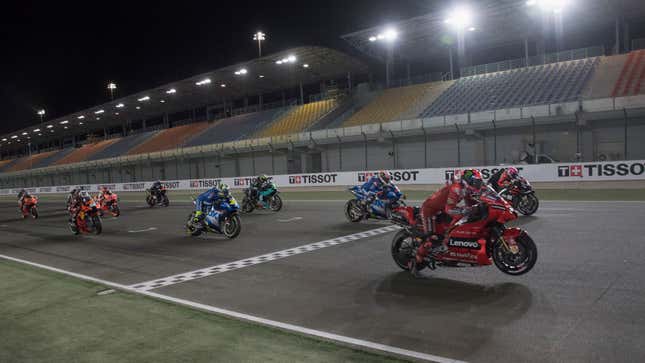
The MotoGP signed a three-year deal to host a race in Indonesia back in 2019 only to have its plans postponed by COVID-19—but the series has announced it plans to stage a test at the Mandalika Street Circuit to prepare for a return to the track with the ultimate goal of arriving in March of 2022. And the United Nations has slammed that plan as a terrible one.
The Mandalika will take place on the Indonesian island of Lombok and is set to be part of a larger resort construction that will be pouring $3 billion into building hotels and a golf course. But to do so, the UN’s Olivier De Schutter revealed that the plan includes destroying houses, fields, water sources, and cultural and religious sites that mean a lot to the local community. And that community, as you have probably already guessed, is being threatened with eviction by force and without compensation.
De Schutter had some strong words for the Indonesian government and for sport as a whole:
The Mandalika project puts Indonesia’s laudable commitments to the Sustainable Development Goals and its underlying human rights obligations to the test.
Large-scale tourism development that tramples on human rights is fundamentally incompatible with the concept of sustainable development.
The time has passed for racing circuits and massive transnational tourism infrastructure projects that benefit a handful of economic actors rather than the population as a whole.
Post-COVID economies should focus on empowering local communities, enhancing their livelihoods and participation in decision-making.
We urge the Indonesian Government to ensure that the ITDC respects human rights and the rule of law, as well as the AIIB and private businesses not to finance or engage in projects and activities that contribute to human rights violations and abuses.
This isn’t the first time a race track project has received criticism for its abuses to human rights. Formula One and Formula E’s plans to race in Saudi Arabia have been criticized as a form of “sportswashing,” where governments utilize large-scale tourist projects to create a more positive image of its country in order to cover up the fact that large populations of people are treated poorly. Bahrain utilized political slaves to build its race track. And there have even been questions about racing in the United States as a question of racial unrest.
These are questions we should be asking when it comes to figuring out the best possible places to host a race. And while there’s an argument to be made that, y’know, non-Western countries do also deserve the luxury of race car, it should never come at the expense of the people living in that area.